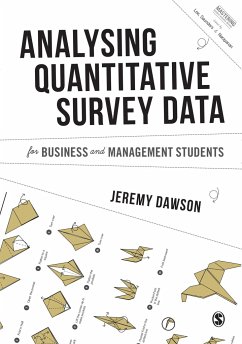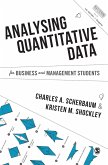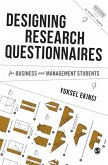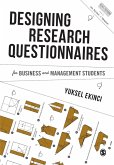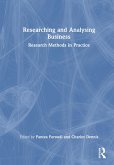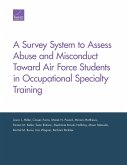Jeremy Dawson
Analysing Quantitative Survey Data for Business and Management Students
Jeremy Dawson
Analysing Quantitative Survey Data for Business and Management Students
- Broschiertes Buch
- Merkliste
- Auf die Merkliste
- Bewerten Bewerten
- Teilen
- Produkt teilen
- Produkterinnerung
- Produkterinnerung
This concise and practical guide explores the use of analysing quantitative survey data using classical test theory as a method for conducting research in a business and management Masters dissertation.
Andere Kunden interessierten sich auch für
![Analysing Quantitative Data for Business and Management Students Analysing Quantitative Data for Business and Management Students]() Charles ScherbaumAnalysing Quantitative Data for Business and Management Students113,99 €
Charles ScherbaumAnalysing Quantitative Data for Business and Management Students113,99 €![Designing Research Questionnaires for Business and Management Students Designing Research Questionnaires for Business and Management Students]() Yuksel EkinciDesigning Research Questionnaires for Business and Management Students113,99 €
Yuksel EkinciDesigning Research Questionnaires for Business and Management Students113,99 €![Qualitative Research Methods for Business Students Qualitative Research Methods for Business Students]() Kingsley O. OmeiheQualitative Research Methods for Business Students157,99 €
Kingsley O. OmeiheQualitative Research Methods for Business Students157,99 €![Designing Research Questionnaires for Business and Management Students Designing Research Questionnaires for Business and Management Students]() Yuksel EkinciDesigning Research Questionnaires for Business and Management Students42,99 €
Yuksel EkinciDesigning Research Questionnaires for Business and Management Students42,99 €![Researching and Analysing Business Researching and Analysing Business]() Researching and Analysing Business220,99 €
Researching and Analysing Business220,99 €![A Survey System to Assess Abuse and Misconduct Toward Air Force Students in Occupational Specialty Training A Survey System to Assess Abuse and Misconduct Toward Air Force Students in Occupational Specialty Training]() Laura L. MillerA Survey System to Assess Abuse and Misconduct Toward Air Force Students in Occupational Specialty Training64,99 €
Laura L. MillerA Survey System to Assess Abuse and Misconduct Toward Air Force Students in Occupational Specialty Training64,99 €![Qualitative Research in Business and Management (Fourth Edition) Qualitative Research in Business and Management (Fourth Edition)]() Michael D MyersQualitative Research in Business and Management (Fourth Edition)178,99 €
Michael D MyersQualitative Research in Business and Management (Fourth Edition)178,99 €-
-
-
This concise and practical guide explores the use of analysing quantitative survey data using classical test theory as a method for conducting research in a business and management Masters dissertation.
Produktdetails
- Produktdetails
- Verlag: SAGE Publications Ltd
- Seitenzahl: 106
- Erscheinungstermin: 10. November 2016
- Englisch
- Abmessung: 244mm x 170mm x 6mm
- Gewicht: 199g
- ISBN-13: 9781473907515
- ISBN-10: 1473907519
- Artikelnr.: 41096017
- Herstellerkennzeichnung
- Libri GmbH
- Europaallee 1
- 36244 Bad Hersfeld
- gpsr@libri.de
- Verlag: SAGE Publications Ltd
- Seitenzahl: 106
- Erscheinungstermin: 10. November 2016
- Englisch
- Abmessung: 244mm x 170mm x 6mm
- Gewicht: 199g
- ISBN-13: 9781473907515
- ISBN-10: 1473907519
- Artikelnr.: 41096017
- Herstellerkennzeichnung
- Libri GmbH
- Europaallee 1
- 36244 Bad Hersfeld
- gpsr@libri.de
Jeremy Dawson is professor of Health Management at the University of Sheffield, where he works jointly with the Institute of Work Psychology (part of the Management School) and the School of Health and Related Research (ScHARR). His research includes a range of topics in the areas of health services management, and research methodology. He has led several large-scale projects in the National Health Service (NHS), particularly focusing on team working, staff engagement and well-being, and their links with patient outcomes, and he led the team that ran the NHS national staff survey between 2003 and 2010. Among his other research interests include team and organizational climate, and work group diversity. He is a statistician by background and teaches a wide variety of subjects in the fields of statistics and research methods, as well as researching in these areas. He has published more than 40 papers in refereed academic journals, as well as numerous project reports and articles in practitioner publications. He is an editorial board member of six journals and an associate editor of the Journal of Occupational and Organizational Psychology. He gained his PhD from Aston University in 2011.
Chapter 1: An Introduction to Classical Test Theory and Quantitative Survey
Data
Chapter 2: Methodological Assumptions, Reliability and Validity
Chapter 3: Basic Components of Analysing Quantitative Survey Data
Chapter 4: Conducting Classical Test Theory Analyses
Chapter 5: Examples of Analysis Using Classical Test Theory
Chapter 6: Conclusions
Data
Chapter 2: Methodological Assumptions, Reliability and Validity
Chapter 3: Basic Components of Analysing Quantitative Survey Data
Chapter 4: Conducting Classical Test Theory Analyses
Chapter 5: Examples of Analysis Using Classical Test Theory
Chapter 6: Conclusions
Chapter 1: An Introduction to Classical Test Theory and Quantitative Survey
Data
Chapter 2: Methodological Assumptions, Reliability and Validity
Chapter 3: Basic Components of Analysing Quantitative Survey Data
Chapter 4: Conducting Classical Test Theory Analyses
Chapter 5: Examples of Analysis Using Classical Test Theory
Chapter 6: Conclusions
Data
Chapter 2: Methodological Assumptions, Reliability and Validity
Chapter 3: Basic Components of Analysing Quantitative Survey Data
Chapter 4: Conducting Classical Test Theory Analyses
Chapter 5: Examples of Analysis Using Classical Test Theory
Chapter 6: Conclusions

